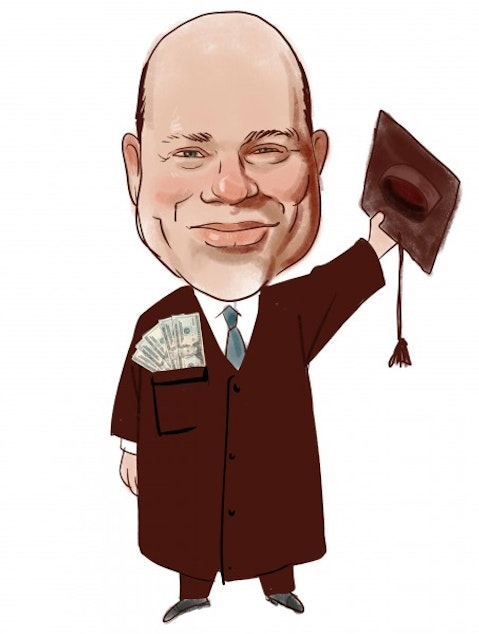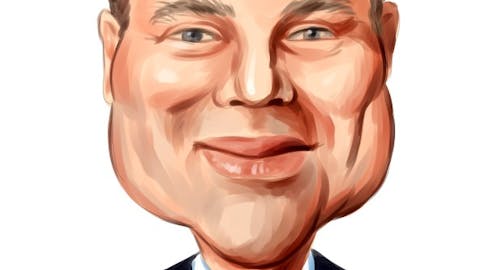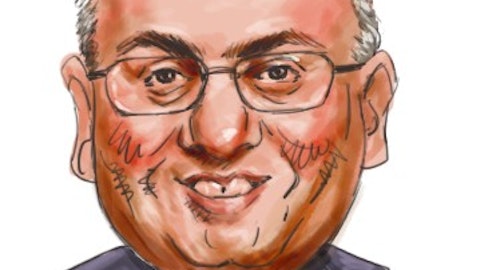Billionaire David Tepper‘s Appaloosa Management is a $16 billion hedge fund that focuses on distressed debt, which also invests in public equity markets. In its last 13F filing, Appaloosa reported an equity portfolio valued at $4.05 billion, which is significantly below $6.79 billion it held at the end of the third quarter. Moreover, we can see that througout 2014, Mr. Tepper has been significantly reducing his fund’s equity portfolio, since its value amounted to over $9.05 billion at the end of March. Nevertheless, despite closing 15 positions during the fourth quarter, mostly cutting the rest of its holdings and initiating only one position, Appaloosa’s equity portfolio is still relatively diversified, with the largest holding representing 12.7% of the total equity portfolio and top five stakes amassing around 46% of the portfolio in aggregate.

Mr. Tepper heavily invests in consumer discretionary, technology and services stocks and many of the holdings in Appaloosa’s equity portfolio are represented by the leading companies in their particular industries. This means, that aside from a significant gain from stock price appreciation, the investor also collects great dividends. In this piece we will look at three stocks among Appaloosa’s largest holdings which have the highest dividend yields.
However, on a side note, even though Appaloosa can gain significant returns from its equity holdings, mimicking its activity by investing in the same companies in which Mr. Tepper holds the largest stakes might not be a good idea for smaller investors. Between 2012 and 2014, equity hedge funds returned 1.4%, 11.1%, and 4.8% per year respectively. This is significantly below S&P 500 ETF (SPY)’s gains of 16%, 32.3% and 13.5% per year respectively. This underperformance is mainly due to the fact that hedge funds have to invest large amounts of money mostly in large-cap stocks, which provide are more efficiently priced and provide smaller returns. On the other hand, we also determined that small-cap stocks provide better returns. Therefore, our small-cap strategy, some results of which we have been sharing in our newsletters since 2012, returned 33.2% in 2012, and 53.2% and 28.2% in 2013 and 2014, respectively.
In Appaloosa’s equity portfolio, General Motors Company (NYSE:GM) not only represents the largest position in terms of value, but also sports one of the highest dividend yields, which amounts to 3.15%. The hedge fund held 14.68 million shares of the company at the end of 2014, the value of the stake amounting to $512.44 million. General Motors Company (NYSE:GM) is an interesting case, because the company was significantly affected by safety recalls last year, which costed it over $4.0 billion. Nevertheless, General Motors is confident that the recall costs won’t affect it so much in the near future and that sales will continue to go up, which is why the company raised its dividend by 20% to $0.36, pending approval from the board. This is why, General Motors Company (NYSE:GM) is one of the favorite automaker stocks among investors. One of the largest shareholders of the ccompany is Warren Buffett’s Berkshire Hathaway, which owns 41.0 million shares as of the end of 2014.
In Whirlpool Corporation (NYSE:WHR), Appaloosa owns nearly 1.70 million shares, valued at $329.09 million, the company representing one of the fund’s long-term investments. With a quarterly dividend of $0.75, Whirpool sports a dividend yield of 1.52%. The producer of home appliances saw its stock surge by almost 40% in the last year, although so did most of its peers, as the consumer electronics industry gained 35% during the same period. Earlier this year, JPMorgan raised its price target on the stock to $210, from $190, maintaining ‘Neutral’ rating. Last year, Whirlpool Corporation (NYSE:WHR) made two important steps in global expansion as it bought a 67% stake in Italian Indesit and 51% in Chinese Hefei Rongshida Sanyo Electric Co. of China, which makes appliances under the Hotpoint and Scholtes brands. All in all, the company is looking optimitistic at 2015, expecting payoffs from its acquisitions and lower raw-material costs. Some investors seem to share the same sentiments, such as Ken Griffin’s Citadel Investment Group, which raised its stake in Whirlpool Corporation (NYSE:WHR) by 74% during the October-December period to 1.62 million shares.
Finally, there is Huntsman Corporation (NYSE:HUN), a $5.30 billion manufacturer of chemical products. While General Motors and Whirlpool are both among the top five holdings in Appaloosa’s equity portfolio, Huntsman is only on the 12th spot. The hedge fund owns 6.11 million shares of the company, valued at $139.28 million. However, Huntsman Corporation (NYSE:HUN) pays a dividend of $0.13, which gives it a yield of 2.30%. Huntsman doesn’t have a long dividend history, but the company started to pay dividends two years after going public in 2005. Moreover, the company’s has last increased its dividend a couple of years ago, the previous dividend amounting to $0.10. Among over 700 funds that we track, the largest sharheolder of Huntsman Corporation (NYSE:HUN) is Dinakar Singh’s TPG-Axon Management, which raised its stake by 90% during the fourth quarter to 8.37 million shares.
Disclosure: none





